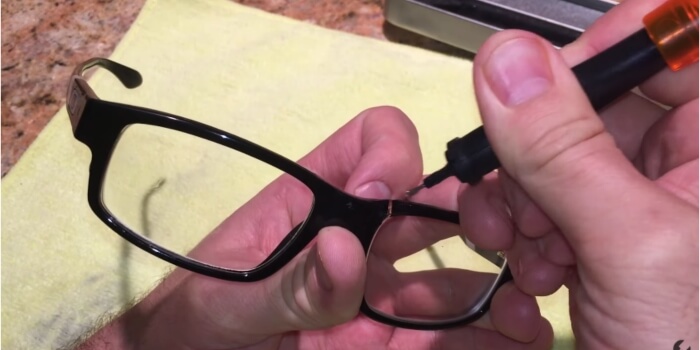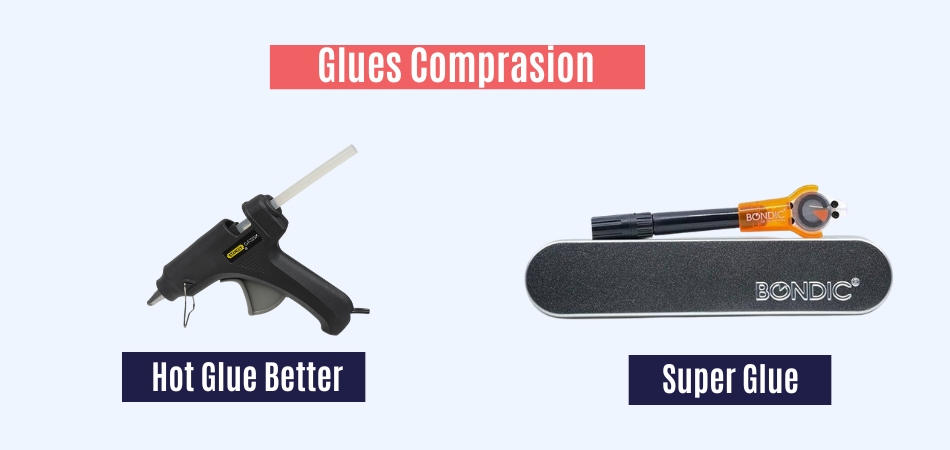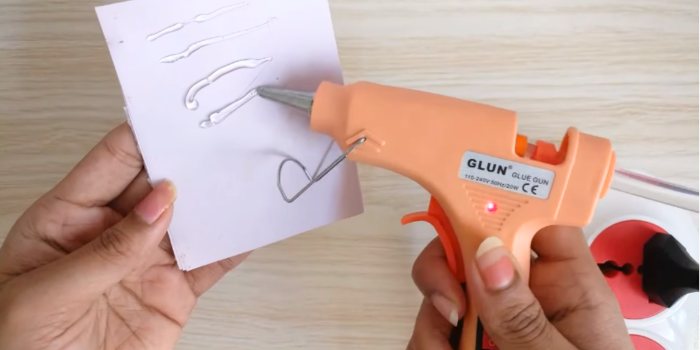Super glue and hot glue are the most versatile and useful materials for DIY projects and crafts. These glues are very useful for people who like to do things for fun, work, or just have fun. They can be used on different things and hold them quickly and securely.
Often a comparison question arises between these two glues: Is hot glue better than super glue?
Both adhesives have strengths, but it depends on the specific requirements of your project. Super glue is incredibly strong and durable, forming strong bonds on non-porous surfaces with remarkable tenacity.
On the other hand, hot glue offers versatility and ease of use, excelling at porous materials and providing a temporary fix for various applications.
Would you like to know more about these two powerful adhesives? Keep reading as we will talk about the differences between hot and super glue and find out which is best for your crafting projects in this article. Let’s dive deep and explore everything.
What is Super Glue and How Does it Work?
Super glue, also known as cyanoacrylate adhesive, is a powerful and fast-acting adhesive commonly used in various crafting, repair, and construction applications. It is a type of resin that cures quickly when exposed to moisture, forming a strong and durable bond between surfaces.

Super glue comes in liquid form and is packaged in small tubes or bottles for easy application. Its ability to create strong bonds on a wide range of materials, including plastics, metals, ceramics, and rubber, makes it a popular choice for both professional tradespeople and hobbyists.
When super glue comes into contact with moisture, either from the air or the surfaces being bonded, it undergoes a chemical reaction called polymerization. This reaction causes the molecules in the glue to link together, forming long chains of polymers that create a tight and durable bond between the surfaces.
The bond forms quickly, typically within seconds to minutes, depending on factors such as temperature and humidity. Once cured, super glue creates a nearly invisible bond that is resistant to moisture, heat, and most chemicals, providing a reliable solution for a wide range of bonding needs.
What is Hot Glue and How Does it Work?
Hot glue, also known as hot melt adhesive, is a versatile adhesive commonly used in crafting, woodworking, packaging, and various DIY projects. It is composed of thermoplastic polymers, typically in the form of cylindrical sticks or pellets, which are melted using a hot glue gun.
The melted adhesive is then applied to surfaces where it quickly solidifies upon cooling, forming a strong bond. Hot glue is available in various formulations, with different melting points and adhesive strengths, catering to a wide range of applications.
When heated in a hot glue gun, the solid hot glue sticks are melted into a liquid state. The melted adhesive is dispensed through the nozzle of the glue gun onto the surfaces to be bonded. As the hot glue cools, it solidifies and forms a bond between the surfaces.
The bonding process occurs relatively quickly, typically within seconds to minutes, depending on the temperature of the glue and the materials being bonded. When hot glue cools and becomes solid, it makes a strong bond that can handle some stress and wear. This makes it good for temporary and semi-permanent uses.
Is Hot Glue Better Than Super Glue?
People who are new to these two types of glue often ask: Is hot glue better than super glue?

Hot glue and super glue have different strengths. Hot glue is versatile and ideal for porous surfaces, while super glue offers a stronger bond on non-porous materials. Choosing depends on the project's requirements. Both have their merits.
However, super glue typically provides a stronger bond compared to hot glue. It forms a tight and durable bond on non-porous surfaces, making it ideal for projects that require a high level of strength and permanence.
Where to Use Super Glue?
Super glue finds its utility across a diverse array of applications, owing to its remarkable bonding strength and versatility. There are numerous super glues you will find on the market, but you must get the best one, like Bondic.
However, understanding where and how to use super glue ensures optimal results and lasting bonds in various projects and repairs.
Repairing Ceramic and Glass
Super glue is particularly effective for repairing ceramic and glass objects such as dishes, mugs, and vases. Its strong adhesive properties create durable bonds that withstand everyday use. Apply a small amount of super glue to the broken edges, press firmly, and hold until the bond sets.
Fixing Jewelry and Accessories
Super glue is a handy solution for repairing broken jewelry, including metal, plastic, or bead work. Its quick-drying formula ensures swift repairs without leaving messy residue. Use a tiny drop of super glue to reattach broken pieces or secure loose components, ensuring a secure and long-lasting repair.
Assembling Model Kits
Model enthusiasts often rely on super glue for assembling plastic model kits, miniature figurines, and scale models. Its precise application and strong bond ensure parts stay securely in place during assembly and display. Apply a small amount of super glue to the connecting surfaces and hold in position until the bond sets.
Securing Electronic Components
Super glue provides a reliable solution for securing small electronic components and repairing delicate circuitry. Its non-conductive properties make it safe for use in electronic repairs. Apply a thin layer of super glue to the component's mounting surface and press firmly into place, ensuring proper alignment.
Crafting and DIY Projects
Super glue is a go-to adhesive for various crafting and DIY projects, including woodworking, leatherwork, and fabric crafts. Its quick-setting nature allows for precise bonding of materials without the need for clamps or lengthy drying times. Use super glue to bond materials securely and expedite project completion.
Repairing Shoes and Leather Goods
Super glue offers a quick and effective solution for repairing shoes, leather belts, handbags, and other leather goods. Its strong bond withstands the rigors of daily wear and tear, ensuring lasting repairs. Apply a thin layer of super glue to the damaged area and press firmly to seal the bond.
Emergency Repairs
Super glue is an invaluable tool for making quick repairs in emergencies, such as fixing broken eyeglasses, sealing minor cuts and wounds, or temporarily patching leaks. Its fast-drying formula provides instant solutions when time is of the essence. Use super glue sparingly and with caution for medical applications.
Industrial and Commercial Applications
Super glue finds extensive use in industrial and commercial settings for bonding metal, plastic, rubber, and other materials in manufacturing and assembly processes. Its high-strength adhesive properties ensure reliable bonds in demanding applications. Follow manufacturer guidelines for proper application and safety precautions in industrial settings.
So, whether you're fixing a broken ceramic mug, assembling a plastic model kit, or securing electronic components, super glue provides a reliable solution for a wide range of bonding needs. Also, make sure to follow manufacturer instructions and safety guidelines for best results and to ensure the safe use of super glue in different applications.
Where to Use Hot Glue?
Now, when crafting, repairs, and DIY projects, hot glue emerges as a trusty companion, offering quick adhesion and versatility. Knowing where to use hot glue ensures successful outcomes and durable bonds in various endeavors.

Crafting and DIY Projects
Hot glue is indispensable for crafting projects, including scrapbooking, card making, and holiday decorations. Its quick-setting nature allows for instant bonding of materials such as paper, fabric, and embellishments. Apply hot glue using a glue gun for precise and mess-free application.
Home Decor and Decor
Hot glue is perfect for creating and embellishing home decor items such as wreaths, floral arrangements, and picture frames. Its strong bond ensures that decorations stay securely in place, even in high-traffic areas. Use hot glue to attach decorative elements with ease and confidence.
Floral Arrangements
Hot glue is a staple tool for florists and hobbyists alike, enabling the assembly of stunning floral arrangements and bouquets. Its fast-drying formula allows for quick attachment of flowers, foliage, and accents to various surfaces. Apply hot glue sparingly to avoid damaging delicate petals.
Costume and Prop Making
Hot glue is a go-to adhesive for creating costumes, props, and cosplay accessories. Its fast bonding and heat-resistant properties make it ideal for securing fabric, foam, and lightweight materials. Use hot glue to assemble intricate details and ensure durability during wear.
Household Repairs
Hot glue offers a quick and effective solution for minor household repairs, such as fixing loose trim, sealing small cracks, and reinforcing weak joints. Its strong bond provides temporary or semi-permanent fixes until more extensive repairs can be made. Use caution when applying hot glue to avoid burns.
Model Building
Model enthusiasts often rely on hot glue for assembling scale models, dioramas, and miniature scenery. Its rapid bonding and easy repositioning make it ideal for constructing intricate details and structures. Use hot glue sparingly to avoid excess buildup and ensure clean, professional-looking results.
School Projects and Displays
Hot glue is a favorite adhesive for students and teachers alike, facilitating the assembly of school projects, science fair displays, and classroom decorations. Its ease of use and quick drying time allow for efficient completion of assignments and presentations. Supervise children when using hot glue to prevent accidents.
Industrial and Commercial Applications
Hot glue finds extensive use in industrial and commercial settings for bonding materials in packaging, product assembly, and manufacturing processes. Its fast bonding and strong adhesion make it suitable for a wide range of materials, including cardboard, plastic, and wood. Follow manufacturer guidelines for proper application and safety precautions in industrial settings.
Frequently Asked Questions
Here are some frequently asked questions about whether hot glue is better than super glue:
Is Hot Glue Stronger Than Super Glue?
Hot glue generally offers a stronger bond on porous surfaces like fabric and wood, while super glue excels on non-porous surfaces such as metal and plastic due to its chemical composition.
Which Adhesive is Better for Temporary Fixes?
Hot glue is often preferred for temporary fixes as it can be easily removed or repositioned without leaving residue, making it ideal for crafting and DIY projects.
Can Hot Glue Withstand Heat Better Than Super Glue?
Hot glue has a lower melting point than super glue, so it may soften or melt under high heat. Super glue, on the other hand, can withstand higher temperatures without losing its bond strength.
Is Super Glue More Resistant to Moisture?
Yes, super glue is generally more resistant to moisture than hot glue, making it a better choice for outdoor or humid environments where exposure to moisture is a concern.
Which Adhesive is Better for Bonding Different Materials?
Super glue is versatile and bonds well with various materials like metal, plastic, and ceramic, while hot glue is better suited for porous surfaces like fabric, paper, and cardboard.
Can Hot Glue Be Painted Over?
Yes, hot glue can be painted over once it has cooled and solidified. However, super glue may not adhere well to painted surfaces due to its strong and non-porous bond.
Is One Adhesive Easier to Clean Up Than the Other?
Hot glue is easier to clean up than super glue since it can be peeled or scraped off surfaces. Super glue requires solvent-based removers and may leave residue behind.
Conclusion
Super glue and hot glue have always been a topic of debate about which one is good. Even people often ask: Is hot glue better than super glue?
Both adhesives offer unique strengths and applications, with hot glue excelling on porous surfaces and providing versatility, while super glue boasts a stronger bond on non-porous materials.
You can make an informed decision to achieve optimal results in your crafting, repairs, and DIY projects by understanding the differences between these two adhesives.






